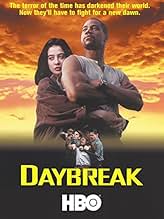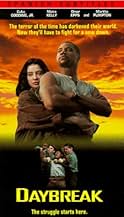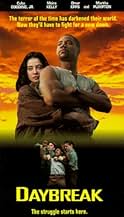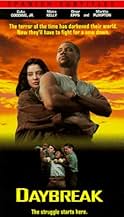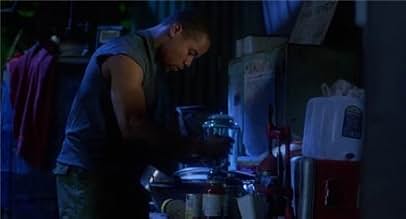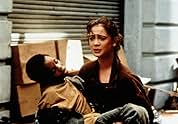NOTE IMDb
5,0/10
1,9 k
MA NOTE
Ajouter une intrigue dans votre langueThis drama, based on Alan Bowne's play "Beirut," takes place in a decrepit New York City of the near future, controlled by a fascist government.This drama, based on Alan Bowne's play "Beirut," takes place in a decrepit New York City of the near future, controlled by a fascist government.This drama, based on Alan Bowne's play "Beirut," takes place in a decrepit New York City of the near future, controlled by a fascist government.
- Réalisation
- Scénario
- Casting principal
Mark Boone Junior
- Quarantine Guard
- (as Mark Boone Jr.)
Charles Mattocks
- Tommy
- (as Charles 'Soll Food' Mattocks)
Avis à la une
Living in 2020 makes it hard to believe anyone would go this far to try and stop a disease. We can't even make people wear masks and stay home... But that doesn't mean it's not plausible for fear to win. It has in the past. The fact this was supposed to be in the near future doesn't exactly age well either but if you can get past that, it's a good movie. Definitely reminiscent of the times back then.
It's a nice story and kept me interested till the end. I enjoyed the ending too. The growth of all the characters. The story still being far from over. It's focus on Blue's journey as she starts a new chapter in her life. It's far from being a masterpiece of the decade but it's worth passing the time with.
It's a nice story and kept me interested till the end. I enjoyed the ending too. The growth of all the characters. The story still being far from over. It's focus on Blue's journey as she starts a new chapter in her life. It's far from being a masterpiece of the decade but it's worth passing the time with.
A few of the people making earlier comments missed the point of this film. The disease described wasn't AIDS-like, it was AIDS. I suspect a few viewers may be too young to remember the near hysteria of the mid to late 1980s that had otherwise rational people calling for all HIV positive people to be permanently interned.
Clearly the writer(s) of Daybreak wanted to illustrate one possible future in which fear was allowed to win out. This has a strong message to send us in 2005 too.
The love story was central to the movie as a chain is created from Ellen to Torch to Blue. Ellen was passionate about saving people. Neither Torch nor Blue started that way but took up the cause when the one they loved fell to the all powerful authorities. The lack of decisive ending, other than the continuation of the resistance, shows that not all problems are easily solved and can be nearly wrapped up in a 1.5 hour movie.
Clearly the writer(s) of Daybreak wanted to illustrate one possible future in which fear was allowed to win out. This has a strong message to send us in 2005 too.
The love story was central to the movie as a chain is created from Ellen to Torch to Blue. Ellen was passionate about saving people. Neither Torch nor Blue started that way but took up the cause when the one they loved fell to the all powerful authorities. The lack of decisive ending, other than the continuation of the resistance, shows that not all problems are easily solved and can be nearly wrapped up in a 1.5 hour movie.
I recorded this because the Tivo program guide description described the movie as a "two rebels fighting a fascist government in the near future." The movie starts promisingly with a failed escape from a medical institution that leads to an execution and an eerily prescient city street scene borrowed (or stolen) from Soylent Green -- a group of people standing around watching a TV behind a barred storefront window, a menacing group of paramilitary thugs intimidating a homeless person, and a couple of girls in uniforms with the label "WorkFare" getting off work.
This should have helped establish a backstory of a bleak near future of economic collapse, government propaganda and tyrany, and, as we're told later on, rampant disease and forced quarantine.
Instead of building on all these ideas to tell what could have been at least as good as "Handmaid's Tale", the script gets lost in a ridiculous love story between Cuba Gooding Jr. and Moira Kelly which is not redeemed even by two sex scenes featuring extensive topless footage of Moira.
The love story detracts from the all-too-plausible social premise of the movie that seems quite believable now: the government is using propaganda, a paramilitary "Home Guard" of thugs and forced internment of people infected with a disease in quarantine centers that are portrayed as country club resorts, but instead are more like Soviet-era prison hospitals where the patients are sent to die.
The budget must not have allowed for much location shooting or set dressing, as the premise of an America in deep decline is offset by Kelly and Martha Plimpton getting on a bus and a number of other scenes shot in high-rise Manhattan that would make it appear that life was functioning normally, in direct conflict to the other, Soylent Green like street scenes and overcrowded apartments.
The AIDS-like disease is also treated in a conflicting manner -- it apparently was a real disease, as Cuba Gooding's band of rebels was actually trying to aide those sick with it, and Gooding made a deliberate attempt to wear a condom before having sex with Kelly -- but we're also led to believe that the sypmtpoms, communicability and perhaps even treatability of the disease wasn't what the government said it was. It would have been more effective (and productive for the storyline) if the disease had been instead a creation of the government as an excuse to put people in a prison-like quarantine where they would die by other means.
Overall, a "near-future" concept which is actually chillingly plausable in our modern times (substitute genetically engineered smallpox for the disease and terrorism detention for the quarantine...) is ruined by a bad love story and a low-budget production.
If you do suffer through this movie, don't miss future Sex and the City characters David Eigenberg ("Steve") as Kelly's brother, and Willie Garson ("Stanford Blatch") as a member of Gooding's rebel gang.
This should have helped establish a backstory of a bleak near future of economic collapse, government propaganda and tyrany, and, as we're told later on, rampant disease and forced quarantine.
Instead of building on all these ideas to tell what could have been at least as good as "Handmaid's Tale", the script gets lost in a ridiculous love story between Cuba Gooding Jr. and Moira Kelly which is not redeemed even by two sex scenes featuring extensive topless footage of Moira.
The love story detracts from the all-too-plausible social premise of the movie that seems quite believable now: the government is using propaganda, a paramilitary "Home Guard" of thugs and forced internment of people infected with a disease in quarantine centers that are portrayed as country club resorts, but instead are more like Soviet-era prison hospitals where the patients are sent to die.
The budget must not have allowed for much location shooting or set dressing, as the premise of an America in deep decline is offset by Kelly and Martha Plimpton getting on a bus and a number of other scenes shot in high-rise Manhattan that would make it appear that life was functioning normally, in direct conflict to the other, Soylent Green like street scenes and overcrowded apartments.
The AIDS-like disease is also treated in a conflicting manner -- it apparently was a real disease, as Cuba Gooding's band of rebels was actually trying to aide those sick with it, and Gooding made a deliberate attempt to wear a condom before having sex with Kelly -- but we're also led to believe that the sypmtpoms, communicability and perhaps even treatability of the disease wasn't what the government said it was. It would have been more effective (and productive for the storyline) if the disease had been instead a creation of the government as an excuse to put people in a prison-like quarantine where they would die by other means.
Overall, a "near-future" concept which is actually chillingly plausable in our modern times (substitute genetically engineered smallpox for the disease and terrorism detention for the quarantine...) is ruined by a bad love story and a low-budget production.
If you do suffer through this movie, don't miss future Sex and the City characters David Eigenberg ("Steve") as Kelly's brother, and Willie Garson ("Stanford Blatch") as a member of Gooding's rebel gang.
Being a big fan of Sci-fi films I expected a much better film. The storyline sounded like heroes would be saving the world in a futuristic "not-so-good" city. However, starting well with good time spend on the lead women, and making it interesting enough for you to sit and watch, it died out as it went along. It's very strange, it's like the first hour of the film is preparing you for some action, like they are building the story line up for some big scene at the end. But the film dies out and leaves you completely hanging, not knowing anything more as to what happens to the main characters, or even what they were fighting for most of the time. I recommend that people stay well away from this one, as Cuba Gooding Jr. has sooooo much more to offer.
This 1993 movie is one of a long line of dystopian (also called "awful warning") stories. In this case one of the key ideas that make dystopias interesting--a fascist government using paranoia to keep the masses in line--is swamped by the romance between Cuba Gooding and Moira Kelly. Of course there is a place for love in such a story--remember Winston Smith and Julia in Nineteen Eight-Four--but in Daybreak the love story eventually overwhelms everything else, and ideas go out the window.
The treatment of the disease that is supposedly rampant in this near-future world is ambiguous. No, the disease doesn't seem like AIDS, but it's unclear just what it is, how much of the population is afflicted by it, and whether or not it is really deadly. At times, you get the sense that the government invented the disease to spread fear among the people, but, then again, clearly some of the people in the movie are sick. It's all sort of confusing.
Cuba Gooding's character is one-dimensional. At first he's very angry and refuses to have anything to do with Moira Kelly. Then, aw shucks, he is forced to admit he really loves her. Moira Kelly's character is semi-believable. To me, however, the really interesting character is that played by Martha Plimpton, who makes the character come alive and has a very interesting face in the bargain.
Somewhere in this movie is a good idea that never manages to break free.
The treatment of the disease that is supposedly rampant in this near-future world is ambiguous. No, the disease doesn't seem like AIDS, but it's unclear just what it is, how much of the population is afflicted by it, and whether or not it is really deadly. At times, you get the sense that the government invented the disease to spread fear among the people, but, then again, clearly some of the people in the movie are sick. It's all sort of confusing.
Cuba Gooding's character is one-dimensional. At first he's very angry and refuses to have anything to do with Moira Kelly. Then, aw shucks, he is forced to admit he really loves her. Moira Kelly's character is semi-believable. To me, however, the really interesting character is that played by Martha Plimpton, who makes the character come alive and has a very interesting face in the bargain.
Somewhere in this movie is a good idea that never manages to break free.
Le saviez-vous
- AnecdotesFilmed in Washington heights new york on 158th street
- GaffesWhen Torch is painting Blue's face with dirt, the angle of the stripes change dramatically between shots.
- Bandes originalesMany Rivers to Cross
Written and Performed by Jimmy Cliff
Published by Island Music, Ltd. (BMI)
Courtesy of Mango/Island Records Ltd.
Meilleurs choix
Connectez-vous pour évaluer et suivre la liste de favoris afin de recevoir des recommandations personnalisées
Détails
Contribuer à cette page
Suggérer une modification ou ajouter du contenu manquant

Lacune principale
By what name was Daybreak - Entre chiens et loups (1993) officially released in Canada in English?
Répondre
